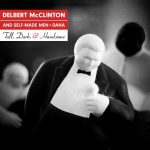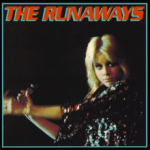
FREDDIE GIBBS & MADLIB, Bandana (CD/LP)
Bandana, the new joint release by Freddie Gibbs and Madib, is weirder, more freewheeling, more Madlib-y than its predecessor. Gibbs remains unphased; he fields each beat like Omar Vizquel and splits it down the middle with raw charisma, torrential flows, and economic, impactful writing. The end result is glorious—the sound of two rap veterans still working at the height of their powers, testing the outer limits of their native chemistry, only to discover that those limits might not exist. On Bandana, Madlib draws from similar source material as Piñata but dramatically repackages it. The production here is more playful and restless. One beat rarely sustains a song from start to finish. Most songs finish with an unexpected, palette-cleansing coda—Gibbs muttering to the engineer from the recording booth, a Japanese man earnestly encouraging the listener to “light the motherfucking weed up, bitch.” Meanwhile, a handful of hairpin-turn, mid-song beat switches give Bandana the brisk, informal structure of a Five Fingers of Death freestyle. While the first half of “Flat Tummy Tea” is like a climactic chase scene, the second half feels like drawing open the curtains in a hungover stupor. “Half Manne Half Cocaine” pivots from sleek, softly twinkling trap bells to hissing cymbals, unintelligible background hollers, and murky left hand piano. Gibbs operates as a countervailing force who grounds Bandana by reliably churning out one tightly coiled verse after another. Gibbs is so charismatic, it’s easy to forget how sharp his pen can be. On the standout track “Cataracts,” he alternates between sweeping, cinematic self-portraits (“Nine extended, clip attached, swinging it like a battle axe”) and alliterative gems (“Turkey bacon bitch like my toast buttered on both sides”). A strong political, anti-authoritarian undercurrent runs through Bandana, as Gibbs seamlessly integrates raised middle fingers to Jeff Sessions, the LAPD and the cop who killed Terrence Crutcher into his well-worn cocaine cowboy routine. These themes mix naturally; Gibbs is a dissenter by nature. He estimates he wrote 80% of Bandana in 2016 in his Austrian jail cell, playing Madlib’s beats in his head as he awaited trial for a sexual assault charge. (He was later acquitted.) His righteous anger boils over on songs like “Flat Tummy Tea,” where he uncorks the most stunning run of the entire album: “Crackers came to Africa, ravaged, raffled, and rummaged me / America was the name of they fuckin’ company / Stackin’ niggas like cargo over and under me / Pick cotton balls and the coca leaf off the money tree.” Bandana may be sequenced according to the beat of Madlib’s wonky drum, but it vibrates with Gibbs’ sense of purpose. Guest features from illustrious peers like Pusha T, Killer Mike, and Mos Def are almost peripheral. Bandana is Madlib’s first album in four years, but it feels like a huge moment for Gibbs in particular. It is the first full-length he’s ever released through a major label, which means that the lead-up to this album goes all the way back to 2007, when Interscope unceremoniously dropped him. In the past year, he’s continued to demonstrate his ability to thrive in disparate production styles, be it the smoky, dimly lit mafia backrooms of Fetti or the distorted, hard-body 808s of Freddie. But even at the time of their release, these projects felt like preludes to Bandana, an album that somehow exceeds the lofty expectations he and Madlib set with Piñata. Gibbs is now 37, almost old enough to qualify him for a rap AARP card, but on Bandana, he sounds more vital than ever. “Real Gs move in silence like Giannis,” he raps, finally ready to receive an ovation worthy of an MVP.

DELBERT MCCLINTON & SELF MADE MEN + DANA, Tall, Dark & Handsome (CD/LP)
If there is one guy who has earned the right to wear a t-shirt with the cliché “Been there-done that” emblazoned on the front, it’s Delbert McClinton. The Texas bred singer-songwriter has been a professional musician for 60 some years; hanging out with the Beatles in 1963, backing blues legends like Bo Diddley, releasing 25 previous studio albums (and winning three Grammys), inspiring the Blues Brothers, starting a successful Americana cruise with artists as eclectic and rootsy as he is, and writing a 2017 biography. And those are just the highlights. Even at 78 years old he continues to tour. At this late stage in his career, he doesn’t need to record new music. But, like the blues icons that inspired him, McClinton is a lifer. And while Tall, Dark & Handsomemay not be his finest moment, it’s a sturdy, unflinchingly eclectic indication of his diversity and sheer professionalism. From the swinging big-band shuffle of the opening “Mr. Smith” to the closing autobiographical acoustic Delta blues of “A Poem” with the opening lines of “I was born and raised in Texas but I’ve been a lot of places,” McClinton covers a large swath of musical ground in these 14 tracks. The pure joy and enthusiasm that powers tunes like the standard Texas shuffle of “Down in the Mouth” and the New Orleans second-line strut of “A Fool Like Me” pushes everything into a Lone Star groove that can best be described as McClinton-esque. Even the obligatory “I’m getting too old to do this” track called “I Can’t Get Up” is infused with a natural swinging blues making it one of this collection’s many standouts. Delbert pens or co-writes this set of all new originals, but it’s the arrangements of tunes such as the walking bass driven supper club jazz of “Lulu” about an old flame who left town but has returned to rekindle the relationship against the singer’s wishes (“you can go to hell but you can’t stay here”) that kick the proceedings into high gear. On “If I Hock My Guitar,” McClinton recycles a Chuck Berry riff as he sings about deciding whether to eat or play the blues. And he shifts into Dan Hicks’ peppy country swing on the humorous “No Chicken on the Bone,” complete with fiddle and backing female vocals. For “Gone to Mexico” the music chugs into percussive Ricky Ricardo territory as McClinton moves to the titular country to forget a broken relationship.Have we heard it all before? You bet. But that doesn’t make it any less enjoyable, especially since everyone involved is clearly having a blast. In other words, it’s McClinton as we’ve come to know and love him, cranking out another solid disc of Americana, Delbert-style. It sounds inspired and freewheeling, like he’s just getting started. And considering his age and extensive resume, that’s quite a compliment.

SOUNDGARDEN, Live At The Artists Den (4xLP)
A deluxe four-album set of one of the best grunge-metal bands to ever trod the Earth, featuring the immortal voice of Chris Cornell on epics like “Blow Up The Outside World,” “New Damage,” “Jesus Christ Pose,” “Spoonman” and many more. FREE SOUNDGARDEN POSTER W/ PURCHASE!
OF MONSTERS & MEN, Fever Dream (CD/LP)
VIOLENT FEMMES, Hotel Last Resort (CD/LP)
BAD-GIRL-ICIOUS REISSUES OF THE WEEK:
The Runaways (LP)
Queens Of Noise (LP)
DREW HOLCOMB & THE NEIGHBORS, Dragons (8/16)
OLD SALT UNION, Where The Dogs Don’t Bite (8/16)
And don’t forget these STILL-NEW platters that matter!
THOM YORKE, Anima (CD/LP)
Thom Yorke describes his excellent new solo album Anima as “dystopian,” which isn’t exactly the hugest surprise in the world. With or without Radiohead, he’s spent his whole career mapping out the dystopia we’re living in—he does futuristic apocalypse the way John Fogerty does choogle. Yorke could have spent the entire record freestyling new verses for “Old Town Road” and it still would have turned out dystopian. But nobody could accuse him of overreacting. At a moment when the world is in even scarier shape than the last time Radiohead took its temperature, on 2016’s A Moon Shaped Pool, he’s moved on to new nightmares. Anima is 48 minutes of abstract electro confessionals, written and produced in close collaboration with Nigel Godrich in a fit of Flying Lotus-inspired experimentation. Within the first few minutes, Yorke’s digitally warped voice is gulping “I can’t breathe” and “there’s no water” over “Idioteque”-style synth swerves and glitch-wave percussion loops. He’s tapping into anxieties both geopolitical and personal. It’s “woke,” but in the sense of “sleep-deprived so long the fluttering of your eyelids booms like kettledrums,” and that realm of paranoid body-freezing anxiety is the zone where Yorke feels right at home. Anima goes with a 15-minute “one-reeler” film with longtime Radiohead cohort Paul Thomas Anderson, set to three of the tracks and co-starring Yorke’s partner, Italian theater actress Dajana Roncione. (The film debuts on Netflix June 27, at the same time as the album.) The music has the open-ended feel of Yorke’s recent projects—his film score for Luca Guadagnino’s Suspiria remake as well as Atoms for Peace. There’s none of the uplifting rock-band rush of last year’s acclaimed Radiohead tour. Instead, he strips down for the old-school beatbox claps of “The Axe,” muttering, “Goddamn machinery, why won’t it speak to me? One day I am gonna take an axe to it.” It builds to a very Yorkean question, as he queries his computer screen: “Where’s that love you promised me?” Like his previous solo albums The Eraser and Tomorrow’s Modern Boxes, it’s shaped into discrete songs that stand on their own, yet the scenery is always in flux. A typical highlight is the superbly titled “I Am A Very Rude Person,” with its sinuous twist-and-crawl bassline under an eerie Gregorian-chant choir. “I have to destroy to create,” Yorke sneers. “I have to be rude to your face / I’m breaking up the turntables / Now I’m gonna watch your party die.” His voice fades under a guitar loop that builds like Robert Fripp filtered through Sonic Youth’s “Karen Koltrane.” The party dies, but not without a fight. The prize is “Dawn Chorus,” a title well known to Radiohead fans as an unrecorded bootleg track dating back to the In Rainbows era. It’s complex but sparse, with a lonesome phased keyboard drone while Yorke murmurs as if waking up from a dream: “I think I miss something, but I’m not sure what.” It makes a striking contrast with the killer finale, “Runawayaway.” It’s a swirl of Byrdsian guitar jangle—after a whole album where guitars are almost entirely absent—while Yorke repeats, over and over, “This is when you know who your real friends are.” As if to imply: Better hope you have some. “Runawayaway” is the kind of climactic album-closer that’s always been a Yorke specialty, from “Street Spirit (Fade Out)” to “Videotape” to “Nose Grows Some.” He sounds anxious, helpless, enraged—yet he also sounds unmistakably alive. And on an album as bleak as Anima, that’s a very welcome sign of hope.
FLAMING LIPS, King’s Mouth (CD/LP)
King’s Mouth has been greeted as a concise return to form for The Flaming Lips: A concept album accompanied by an immersive art exhibition and a children’s book, about a monarch with a giant head that contains galaxies and weather systems, narrated by former Clash guitarist Mick Jones. t’s a moot point as to whether Jones sounds either rapt with innocent wonder as he reads, or like a man who hasn’t got a clue what he’s supposed to be going on about.Despite the concept and accompanying folderol, what lies at its heart are a succession of songs more straightforwardly appealing than anything the Flaming Lips have come up with in years. It’s nothing as craven as a direct return to the sound of The Soft Bulletin and Yoshimi Battles the Pink Robots – it’s comparatively stripped-down, less widescreen in its musical ambitions, more obviously reliant on electronics that sound like electronics rather than a dense patchwork of samples – but it shares with those albums the sense of a band marshaling their energies and abundance of outre ideas into relatively short, honed, lushly melodic bursts. At their best – “Mouth of the King,” “All For the Life of the City” – the songs here are a total joy, reacquainting you with certain strengths the Flaming Lips have tended to obfuscate on recent releases. Multi-instrumentalist Steven Drozd has the ability to mold a wildly varied set of musical backdrops into a cohesive whole – the album goes from the fidgety distorted funk of “Feedaloodum Beedle Dot” to the 10cc-ish AOR of “The Sparrow” to the cinematic, choral sample-bedecked instrumental “Funeral Parade” without seeming disjointed, largely because whatever style they’re essaying, it somehow always sounds like the Flaming Lips. Wayne Coyne can still project childlike wonder and homespun wisdom without sounding cloying. It’s a trick much in evidence here: “Giant Baby” finds him reflecting on his mother’s death and concluding that “life is sometimes sad”; on the concluding “How Can a Head,” he’s gawping in wonder at the powers of the human brain. “How Can a Head” is the album’s highlight, blessed with as lovely a melody as the band have ever written. Luxuriating in it, you’re struck by the sense that you should probably enjoy it while it lasts. If the Flaming Lips’ recent history has taught us anything, it’s that their next album will probably be confounding: abnormal service resumed.
PRINCE, Originals (LP)
Capable of upstaging Eric Clapton on guitar, releasing powerful pop that toed the line between apocalyptic and sexy, and contorting his voice to do just about anything, there was no limit to Prince’s abilities. But not everybody is aware the purple one was also a prolific ghostwriter, penning hits for everyone from The Bangles to Kenny Rogers and Stevie Nicks. The new posthumous album ‘Prince: Originals’, which has been released by the Prince Estate in collaboration with Warner Bros and Jay-Z’s streaming platform Tidal, has raided the vaults of Paisley Park to bring together 14 reference tracks Prince laid down for other artists, with this collection acting as a fascinating time capsule of the 1980s. Prince nails the deep nasally vocals of a country singer on ‘You’re My Love’, a track he tellingly penned for Kenny Rogers, while his effeminate vocals channel the experience of being an independent black woman on ‘The Glamorous Life’, the hit single he wrote for frequent collaborator Shelia E. Hearing. Prince, singing two songs that are so different stylistically, reminds us just how insanely talented he was, with the artist possessing a chameleon-like ability to master practically any genre of music. ‘Prince: Originals’ is at its best when Prince lets loose and embraces his cheekier side. The phallic symbolism of ‘Sex Shooter’, which contains the playful lyrics “I need you to pull my trigger babe / I can’t do it alone”, is one hell of a ride, while the absolutely bonkers ‘Holly Rock’ sees Prince talking slick over a beat that sounds like it was crafted from a psychedelic pinball machine. Honestly, it’s a shame Prince ever gave these tracks away to other artists. Although the camp synths and indulgent guitar solos present on a lot of these tracks are clear by-products of the decade that gave us cone bras, Super Mario and The Goonies, this music also sounds prescient, with the raw experimental funk of ‘Wouldn’t You Love To Love Me’ (written in 1981 for singer Taja Seville) sounding like it would be right at home on bold 2019 releases such as Tyler, The Creator’s ‘Igor’ and Steve Lacy’s Apollo XXI. The fact you can hear Prince so obviously channeled when listening to these two modern black artists is a powerful reminder of just how ahead of its time his music was.
TUXEDO, Tuxedo III (CD/LP)
The L.A.-based duo of Mayer Hawthorne and and Jake One, collectively known as Tuxedo, was ahead of the mainstream pack upon the arrival of its self-titled 2013 EP. Boasting the Zapp-influenced bouncer “So Good” and the caressing slow-jam “Get U Home,” the guys’ sleek brand of west coast funk undoubtedly provided a few hints for both Mark Ronson and Bruno Mars, with “Uptown Funk” and “24K Magic” building upon their old-school vibe—albeit with a more commercial vocal approach. Tuxedo’s first and second full-length albums, each endowed with a consistent cross-section of smooth top-down jams and laid back, lights-down passages, cemented their credibility and earned them a seriously appealing collaboration with Zapp on last year’s “Shy.” Although that gem is unfortunately not included on the team’s new Tuxedo III LP, Hawthorne and One continue to stick to their mandate of understated boogie finesse without resorting to too many faddish adornments. Assimilating instrumental moments and rap interludes into the mix, Tuxedo aims to broaden its base via numbers such as the hook-centered ditty “Gabriel’s Groove” and the lowrider swayer “Dreaming in the Daytime.” A seamless continuation of previous shining entries such as “Lost Lover” and “Watch the Dance,” the uncomplicated “You & Me” delights with lightly poppin’ percussive effects amidst a bubbly beat and sophisticated keyboard work. This example of sticking to the rhythmic foundation of the group’s defining works—while adding in a few subtle vocal embellishments—is the type of cut that continues to set Tuxedo apart from many of its contemporaries. Likewise, “OMW” carries that engagement forward. Slivers of vocoder and cleverly punctuated phrases add to its cool factor. On the slow-jam tip, the short and sweet “Extra Texture” benefits from colorful lyrics and an easily gliding, memorable hook complemented by the production prowess of DāM-FunK, and the vibrant closing number, “Close,” spotlights up-and-coming female vocalist Gavin Turek. Employing a buoyant tone which pairs ideally with Hawthorne’s co-lead and just the right dose of computerized vocal effects, she enriches the feel-good disposition of the track.A majority of the selections on Tuxedo III clock in at just under or over three minutes. That keeps the flow moving along nicely, as most of the tracks segue nicely into one another. Accordingly, listeners who’ve been with Tuxedo from the start may find themselves desiring a bit more in the meat and bones of some of the material, while newcomers are likely to find themselves intrigued with the team’s cultivated sowing of solid, yet nonabrasive, grooves and unassuming melodic stance.
LARRY SPARKS, New Moon Over My Shoulder (CD)
Larry Sparks was still a teenager when Ralph Stanley chose him to replace his brother Carter Stanley as guitarist and lead singer in the Clinch Mountain Boys in the wake of Carter’s passing in December 1966. As the ensuing decades would amply demonstrate, Sparks was to become much more than the answer to a bluegrass trivia question. His bluesy vocals and guitar work gained him a lot of fans. After a couple of years, he left to form his own band, and this new release – his first of new music in five years, and now back with his longtime label, Rebel – celebrates a half-century of touring with his Lonesome Ramblers. Along the way, he picked up a couple of IBMA nods as Male Vocalist of the Year as well as a Best Album award. Like the Stanleys, he still prefers the “old sounds” and seems to have the knack of sounding better the older he gets. Sparks’ penchant for putting the “blue” in bluegrass is on full display here, and he continues to excel at drawing material from a wide variety of sources (Roy Acuff, Jimmie Davis and longtime favorite Gary Ferguson, to name a few) covering many moods and tempos. The wistful title track, “There’s A New Moon Over My Shoulder,” was a wartime hit for Tex Ritter that was still popular during Sparks’ boyhood years in Ohio, while “Henry Hill” (one of two Ferguson tunes) is a classic of the “hard times” genre. Sparks is perhaps at his best, though, on the closer, the traditional “Green Pastures In The Sky.” A man of abiding faith, it’s on these classic gospel-tinged tunes that his comfortable, craggy baritone conveys the most emotion and conviction. He’s hinted at times over the years that he thinks about retirement, and his recent releases have tended to be “anniversary” celebrations of various milestones in his career, but Sparks continues to prove he’s one of the most reliable talents in the history of the bluegrass genre, and we wouldn’t mind it if he booked some more studio time.









